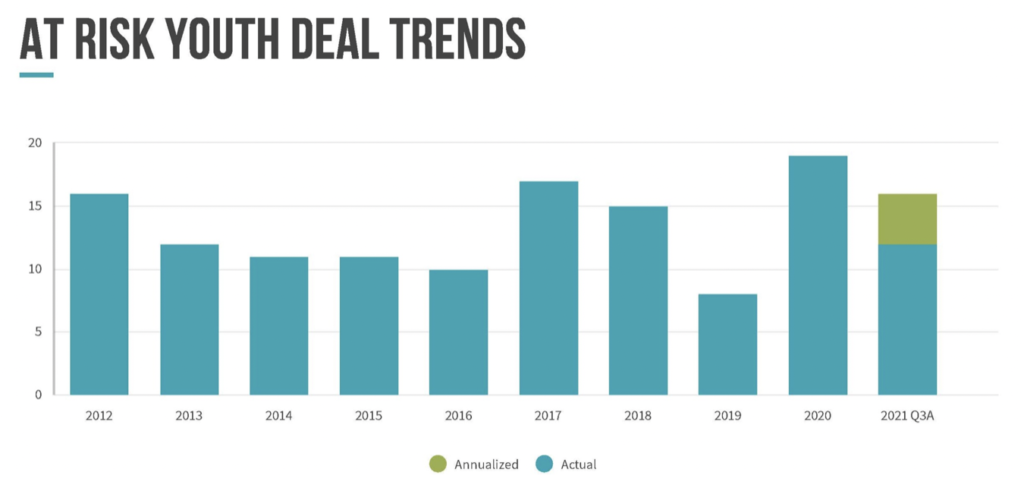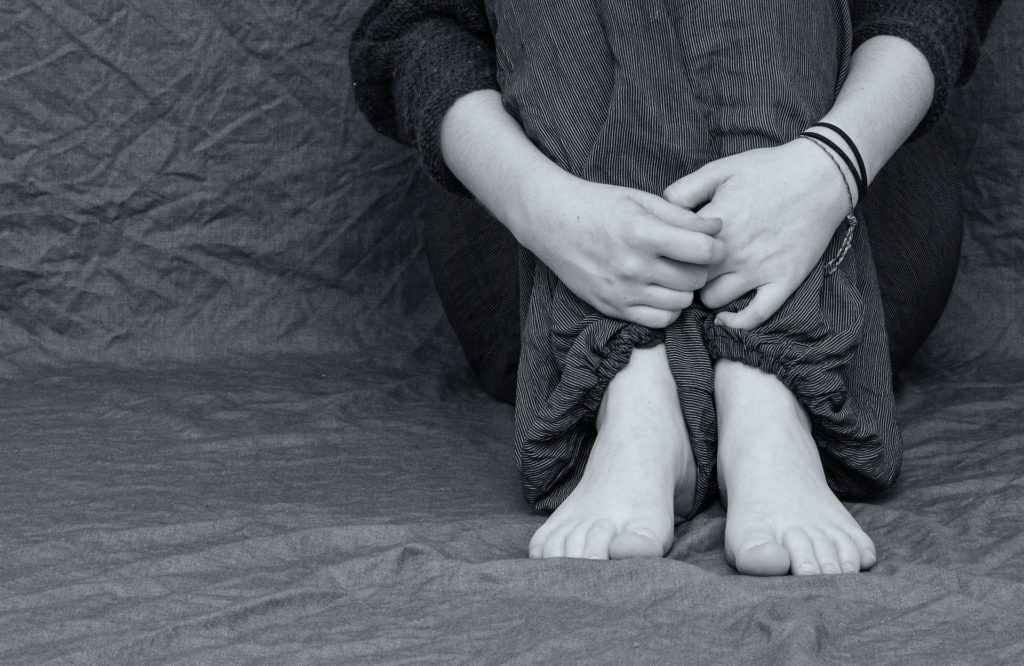The pandemic and other factors have contributed to worsening mental health conditions for a number of Americans since the beginning of 2020, but particularly so for young people.
There is a growing consensus that youth mental health – more than ever – is a serious issue, as an estimated 31% of American parents have children whose emotional state has declined during the pandemic. And subsequently, youth behavioral health providers are trying to meet the need for assistance.
The serious state of young Americans’ mental health was also recently underscored by a declaration made by U.S. Surgeon General Dr. Vivek Murthy.
“Even before the pandemic, an alarming number of young people struggled with feelings of helplessness, depression, and thoughts of suicide — and rates have increased over the past decade,” Murthy said while issuing an advisory in December on youth mental health, effectively declaring it a national public health issue.
The agency previously sounded alarm bells on behavioral health when it issued an advisory in 2018 addressing the opioid use disorder (OUD) epidemic. However, advisories are infrequently issued and are usually done when a health occurrence – such as OUD – reaches crisis proportions.
“The COVID-19 pandemic further altered their experiences at home, school, and in the community, and the effect on their mental health has been devastating,” Murthy added. “The future wellbeing of our country depends on how we support and invest in the next generation.”
Along with federal resources being poured into mental health assistance for young Americans, private investment into providers focused on this population is increasing as well.
Ted Jordan, managing partner of health care M&A advisory firm The Braff Group, has seen rising investor interest in behavioral health providers servicing the youth population.
According to data from The Braff Group, there were close to 20 deals for providers of services to youth deemed “at-risk” in 2020, part of a record-breaking year of overall mergers and acquisitions activity among operators of behavioral health services.

Over half of that number occurred as 2021 wound down, which The Braff Group estimated as being another year of all-time highs for behavioral health transactions across the board.
Among 2021’s notable transactions in overall youth behavioral health services include Onex Partners taking a majority stake in Newport Healthcare for a reported $1.3 billion, Cerberus Capital Management making a $400 million strategic investment in Lighthouse Autism Center and the Ontario Teachers’ Pension Board Plan buying applied behavior analysis (ABA) therapy provider Acorn Health.
The Stepping Stones Group, a multi-state provider of ABA therapy and other youth behavioral services, made news last May as well with its acquisition of Massachusetts-based Futures Health Group.
Jordan believes that worsening youth behavioral health conditions and the need for assistance are subsequently facilitating more deals ahead among providers.
“You’re seeing a lot of increased demand for [youth] services,” Jordan told Behavioral Health Business. “And with that comes increased interest from an acquisition perspective.”
Newport Healthcare scaling to meet youth mental health needs
In 2019, over 13% of children ages 5-17 had received mental health treatment over the course of a 12-month period. The pandemic – along with other factors such as racial and social unrest – have perhaps brought those numbers up since then, with treatment options for youth ranging from generalist behavioral providers to residential facilities.
One of those youth-focused providers is Nashville, Tennessee-based Newport Healthcare, which operates around 50 residential and outpatient locations on the East and West Coasts, and which treats for a variety of conditions such as anxiety, depression, trauma and substance use disorders.
“A big part of interest in Newport is being able to really scale a standard of care,” Newport Healthcare COO Jameson Norton told BHB.
Newport Healthcare operates two programs: Newport Academy, which offers day schooling, residential and outpatient services for youth ages 12-17; and the young adult-focused Newport Institute, which is geared toward patients ages 18-27 and provides partial hospitalization and intensive outpatient programming along with residential services.
Both Newport Healthcare and Newport Institute specialize in individual psychotherapy modalities such as attachment-based family therapy (ABFT), which works at getting to the root of relationship breakdowns between children and their families. Family and group therapies are also available through both Newport Healthcare programs, with telehealth services provided to alumni upon completion of their programs.
Additionally, Newport Healthcare operates The Center for Families, an outpatient program located west of Philadelphia in Malvern, Pennsylvania that serves teens 13-18. Along with ABFT and other individual therapeutic offerings, the Center provides experiential therapies to young clients that involve activities like music, yoga and outdoor recreation.
Using standard behavioral assessments, Newport Healthcare claims that over 1,400 clients as recently as 2020 experienced considerably lower levels of depression and anxiety while receiving services.
Norton said that youth at Newport — like many youth across the country — are grappling with a variety of societal issues, and he has praise for Murthy’s declaration.
“It is really staggering – what big issues that age group has had to grapple with from on many fronts,” Norton said. “[Whether it is] racial injustice, climate change [or] social media, we’re seeing a staggering escalation of issues, in addition to the pandemic.”
For families with children who are dealing with behavioral health conditions but who feel unaware about their options, Norton believes that the advisory could generate more awareness for youth mental health services, with word-of-mouth spreading about what Newport can potentially offer.
“We feel great about the clinical model that we’re able to provide,” he said. “And we’ve had high fidelity to that model.”
Virtual behavioral health platforms gear up to offer more youth services
Telehealth has become such a valuable health care delivery tool during the pandemic that it is easy to forget that not long ago, many had questions about its efficacy. In fact, 65% of Americans reported having doubts about the quality of telehealth in early 2020, according to management solutions company Sykes Enterprises.
Since then, a number of restrictions at the state and federal levels have been relaxed to allow for increased telehealth services, with usage across the health care spectrum jumping by 38-fold.
The increase in telehealth – coupled with worsening youth mental health conditions – has been a boon for youth-focused virtual behavioral health providers, who in the first half of 2021 raised $400 million, according to investment management company Telosity by Vinaj Ventures. That number was up 671% from the year before.
Among those recipients are providers such as unicorn company Elemy, Brightline, Cortica and Akili Interactive, which together have raised over $750 million to date, according to figures published by fundraising tracking site Crunchbase. And 2022 has kicked off on an active note for youth telebehavioral health investment, as wearables platform Kiddo and pediatric services provider Little Otter have both scored tens of millions in Series A funding.
The youth telebehavioral health market might also be getting a lift from more families enthused about using virtual services for their children.
According to a survey conducted by the nonprofit Child Mind Institute and polling company Ipsos, parents had overwhelmingly high marks for telebehavioral health positively impacting their children.
A number of published academic articles have additionally lent support to the adequacy of youth telebehavioral health services – even as some literature asserts that more work needs to be done regarding telehealth’s clinical validity and ethical standards.
SilverCloud Health – which was acquired last August by telehealth provider Amwell as part of a $320 million transaction – is a digital behavioral health platform that is rolling out new youth-oriented services for mental health.
The Boston-based company – which provides 24/7 coaching and self-guided support programs – is unveiling three programs in 2022 for youth that it says will take into account the increased levels of stress nationwide since the pandemic’s onset.
Two of the programs are geared for two different age groups – ages 5-11 and 12-18 – and provide clinical interventions such as psychoeducation for families and youth dealing with conditions like anxiety. Another program is tailored toward youth ages 15 and older, which helps guide users in mindfulness practices.
All three programs will eventually be available in all 50 states through more than 500 health plans, health systems and employers that SilverCloud works with.
SilverCloud Senior Digital Health Scientist and PHD Angel Enrique Roig said that all of the company’s offerings – including the new youth programs – are meant to serve as a piece of the puzzle in improving mental health rather than being an end-all solution.
“As the providers work with these interventions, the skepticism dilutes because they see the value of it,” Roig told BHB. “Sometimes the skepticism is about these products being a replacement for therapy. We are not a replacement, we are an enhancement.”
He believes that the company’s new programs can especially engage young users given their tendency to flock to and adopt new technologies.
“It feels totally right for them to learn through an app,” he said. “In that regard, they are very suitable for these interventions. That’s why we should leverage the use of technology to expand access to mental health care, especially in this time of need.”
Companies featured in this article:
Akili Interactive, Brightline, Child Mind Institute, Cortica, Elemy, Ipsos, Newport Academy, Newport Healthcare, Newport Institute, SilverCloud Health, Telosity by Vinaj Ventures, The Braff Group



